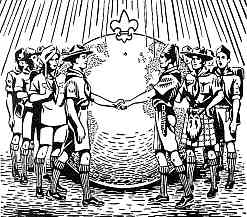|
|
|
49. Scouts of the World - Brothers
Together
The love of games is the natural heritage of
all American youth
and the Boy Scouts supplement these with hiking, camping, and
wood-craft - all things that mean stronger and healthier bodies -
things we should never neglect in a world full of mechanical and
electrical conveniences.
We are coming into a new world with
rapid communication and
transportation and will have many new problems. It will be a smaller
world - a world in which formerly distant peoples of different races
and customs will almost become our neighbors. And the Scouts by a
practical demonstration here at home have shown us one way to meet this
problem. The Boy Scouts, recognizing no barriers of race, color or
creed, have been successful in fusing these elements into a great
cooperative group whose members are today fighting for our country on
all the World's battlefronts.
When the war came, it threatened to destroy
the scout movement in
many countries because the Scouts stood for so many things which the
dictators opposed. But the scouts, like so many democratic
institutions, have managed to survive. They survived in the Philippines
and were waiting to welcome General MacArthur when he returned. In
Holland they met secretly under unknown leaders and although their
activities were forbidden by the Nazis in Belgium, there was a scout
group there ready to go to work when the country was liberated.
|
|









